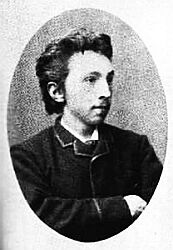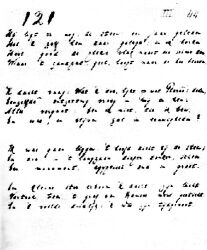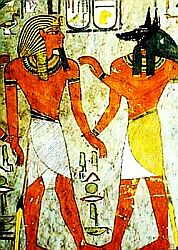|
Johannes Andreas der Mouw
|
|||||||||||||||||||||||||||||||||
|
Johannes Andreas der Mouw, born in the Netherlands
on July 24th., 1863, was a major Dutch philosophical writer of the early 20th. Century. Since Dutch is not a widely read
language internationally, I have decided to translate some of his sonnets into English. By so doing, I hope to acquaint an
international readership with these poems and give them the recognition they so deserve.
His mother, an intelligent woman, was the primary caregiver of her sensitive, physically weak child, whom she introduced to
the beauties of music. His grandmother, the other key figure in his life, used to read him stories from the Bible that stirred
his abiding thirst for religion. His poetry often resonates with fond memories from his school years.
He even studied cosmography. It has been claimed that, while still a student, he experienced "a cosmic epiphany" while star
gazing at the Milky Way in the night sky, which he relates to us in his poems. In 1883 he enrolled in the University of Leiden
where he studied Latin, Greek, Sanskrit and philosophy. From 1888 to 1890 he worked on his dissertation, "Quomodo
Antiqui Naturam mirati sunt?" (How did the ancients view nature?).
No true understanding of Der Mouw's poetry can emerge without recourse to the premises he put forward in his dissertation.
As the early Greeks arrived from the East and conquered Greece, they perceived of life and nature as Unity, according to Der
Mouw. Gradually, this sense of unity was supplanted by dualism, as spirit and nature became differentiated in the Greek mind.
At the apogee of Greek culture, philosophers such as Plato and Aristotle had asserted the primacy of the spirit over nature.
This spiritualism was further fortified in the early days of Christianity. In our modern Occidental world, Der Mouw argues,
man and nature are viewed as totally disparate. However, modern man still experiences a feeling of loss and has a latent wish
to regain the sense of oneness with nature.
Der Mouw suffered from frequent bouts of sometimes suicidal depression. His own pessimism seemed echoed in the works of Schopenhauer,
to which he had recourse at the time.
He and Schopenhauer shared an enthusiasm for the ancient Indian scriptures, the Vedas and Upanishads. He pursued his philosophical
studies, which were to occupy him from 1905 to 1912. Eventually, he abandoned his Christian faith, objecting its anthropomorphic
God, anthropocentric world view and dualism of life on earth and life in the hereafter. He eventually came to the conclusion
that the Vedas and Upanishads were the only true repositories of mysticism resonate with his own youthful experiences of epiphany.
Eventually, he sought set his insights to poetry. From 1913 to 1919, he devoted his life to writing his poetic works. He met
another Dutch writer, Frederik van Eeden, who at once recognized his poems as, "real, from start to finish and very special."
He urged Der Mouw to publish, and several finally were, in literary magazines in 1918. Finally, on July 3rd., 1919 he was
to learn: "Your book will be printed this week." The next day, his wife discovered him unconscious in his study. On July 8th.,
1919, he passed away.
His sonnets echo his philosophical and religious ideas, juxtaposed with scenes from day-to-day life, thus expressing his feeling
of the "unity of everything". The poem "I am Brahman" is a case in point. Its first line indicates his idea that man and Brahman
(God) are one, an idea already present in the Veda's. The simple fact, however, that his housemaid has handed in her notice
makes him realize that she and her work are equally important as the works of his favourite philosophers and artists.
© by Remco van der Zwaag, 2002
|
|||||||||||||||||||||||||||||||||
|
|
|
 |
|



